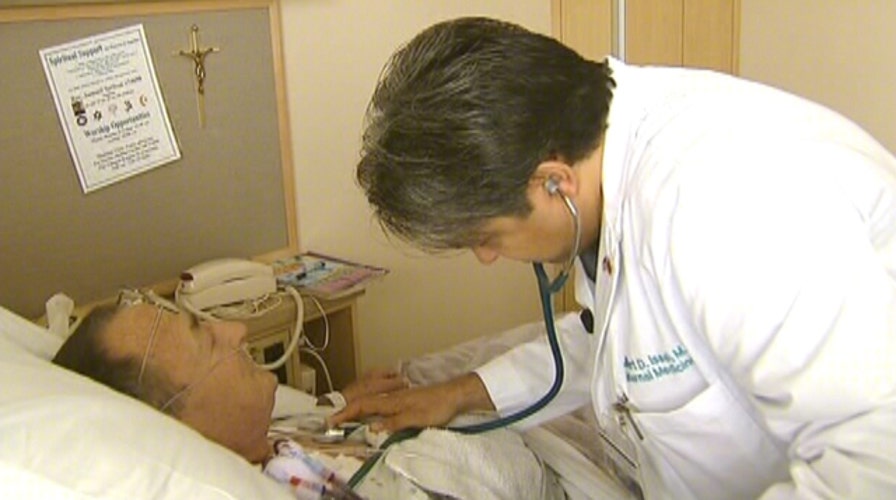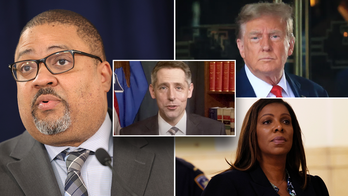States weigh whether to take gov't funding, expand Medicaid
William La Jeunesse reports from Los Angeles
Little has changed in the year since Arizona Gov. Jan Brewer famously pointed an accusatory finger at President Obama on an airport tarmac.
Brewer still fancies herself as a states' rights advocate fighting against the perceived excesses of the federal government. And Obama, fresh off a reaffirming election victory, remains in the White House and overseeing massive reforms in health care coverage he says are necessary for the country's future.
That's why Brewer's recent decision to accept a huge pot of money available to states under ObamaCare's Medicaid expansion was a notable act of cooperation between the Republican governor and the Democratic administration she's berated, scolded and sued.
"It's a decision some would prefer not to face," Brewer recently told the Arizona legislature. "They'd like to wish it away. We cannot."
Brewer also made light of her charged encounter with the president. "Nor can we simply wag our finger at the federal government. Trust me: I tried that once."
But there remains a divide among the nation's governors over whether to accept the Medicaid money.
According to a tally by the Advisory Board Company, Brewer and 24 other governors across the country consider the promise of a new federal money stream too good a deal to pass up. Brewer says it'll mean a couple of billion dollars for the Arizona economy, add jobs and reduce the financial strain on hospitals and clinics who have to cover the costs of caring for the uninsured poor who can't pay their bills.
"Saying 'no' to this plan would not save these federal dollars from being spent or direct them to deficit reduction," Brewer determined. So far, five other Republican-led states -- Nevada, New Mexico, North Dakota, Michigan and Ohio -- have announced support for the expanded program.
[pullquote]
But 15 states, all led by Republican governors, aren't so keen on the administration's Medicaid expansion deal and have begged off. The leaders of 11 states have yet to announce a position on the issue and are expected to do so in the weeks ahead.
The governors who've announced their opposition say it's too costly, they don't want to invite more federal red tape into their states and the money made available from Washington is a mirage. "People say it's free federal money," Nebraska Gov. Dave Heineman told Fox News. "(Those funds are) our tax dollars, your tax dollars and my tax dollars. So don't pull that game on me."
Under the current ObamaCare arrangement, the federal government in 2014 will cover the full cost of the Medicaid expansion for three years. The expansion range covers people who are at the federally designated poverty line to 133 percent of that total -- $14,893 for an individual. Then the feds will gradually reduce their share of the costs until 2020, when Uncle Sam promises to pay 90 percent, with the states covering the balance.
But Heineman has deep suspicions that Washington lawmakers will eventually renege on the deal and ask states to pick up more of the tab. That happened with special education funding and Heineman says it could easily happen again.
"Medicaid has the potential to bankrupt the states," he predicts, thus forcing states to take money away from education or raise taxes to make up the difference. Plainly stated, Heineman said, "We shouldn't go there."
Medicaid started in 1966 as part of President Lyndon Johnson's Great Society. Costs have always been shared among Washington and the states. It was originally designed as a government-backed insurance option for the poorest of Americans. But eligibility has expanded over the years to now cover nearly 60 million people and will grow even more under ObamaCare.
Starting in 2014, all low-income adults, not just those with disabilities or dependants, will be eligible for Medicaid. And because of ObamaCare's individual mandate, all Americans, regardless of income, must enroll in a health insurance program. States must bring poorer individuals into the fold under the base terms of Medicaid. But the Supreme Court ruled last year the states do get to choose, without fear of penalty, whether to accept the federal government's offer to expand the income threshold to the 133 percent of poverty level.
"The federal government with ObamaCare has sort of set up a trap in some ways for governors, like Jan Brewer, who because they're in this tough situation where on the one hand, do you want to expand a program that's going to cost your state money in the long run and may not work very well?" Reason Foundation's Peter Suderman said in an interview. "On the other hand, do you want to deny your health providers a big pot of federal money?"
A decision to reject the additional funds doesn't foreclose states from joining in at a later date. In 1966, only 26 states signed up during Medicaid's first year of availability. By 1970 all but two states (Alaska and Arizona) joined in, and now all states participate. It's something expansion opponents point to in case they're eventually convinced the new terms make sense.





